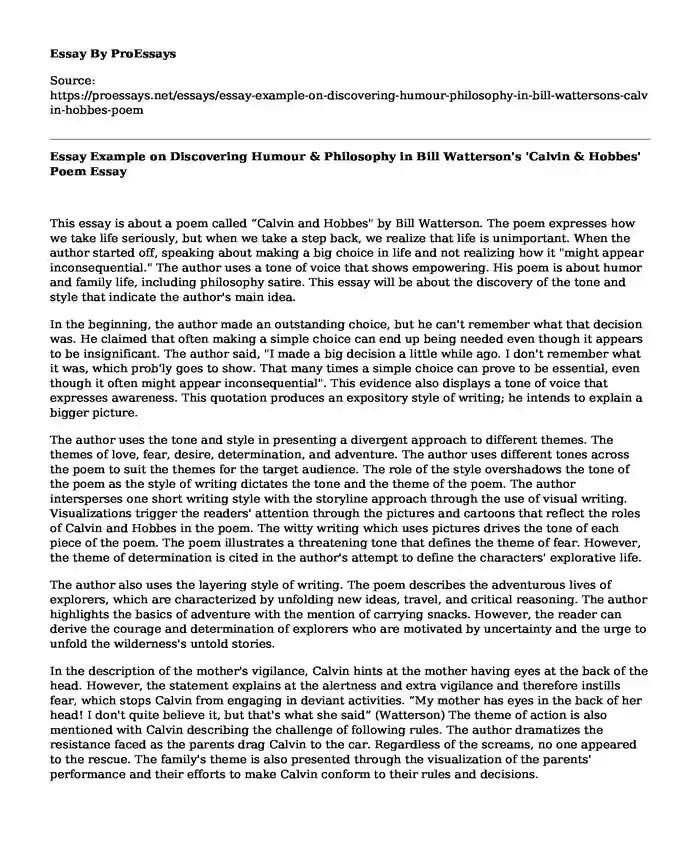This essay is about a poem called “Calvin and Hobbes" by Bill Watterson. The poem expresses how we take life seriously, but when we take a step back, we realize that life is unimportant. When the author started off, speaking about making a big choice in life and not realizing how it "might appear inconsequential." The author uses a tone of voice that shows empowering. His poem is about humor and family life, including philosophy satire. This essay will be about the discovery of the tone and style that indicate the author's main idea.
In the beginning, the author made an outstanding choice, but he can't remember what that decision was. He claimed that often making a simple choice can end up being needed even though it appears to be insignificant. The author said, "I made a big decision a little while ago. I don't remember what it was, which prob'ly goes to show. That many times a simple choice can prove to be essential, even though it often might appear inconsequential". This evidence also displays a tone of voice that expresses awareness. This quotation produces an expository style of writing; he intends to explain a bigger picture.
The author uses the tone and style in presenting a divergent approach to different themes. The themes of love, fear, desire, determination, and adventure. The author uses different tones across the poem to suit the themes for the target audience. The role of the style overshadows the tone of the poem as the style of writing dictates the tone and the theme of the poem. The author intersperses one short writing style with the storyline approach through the use of visual writing. Visualizations trigger the readers' attention through the pictures and cartoons that reflect the roles of Calvin and Hobbes in the poem. The witty writing which uses pictures drives the tone of each piece of the poem. The poem illustrates a threatening tone that defines the theme of fear. However, the theme of determination is cited in the author's attempt to define the characters' explorative life.
The author also uses the layering style of writing. The poem describes the adventurous lives of explorers, which are characterized by unfolding new ideas, travel, and critical reasoning. The author highlights the basics of adventure with the mention of carrying snacks. However, the reader can derive the courage and determination of explorers who are motivated by uncertainty and the urge to unfold the wilderness's untold stories.
In the description of the mother's vigilance, Calvin hints at the mother having eyes at the back of the head. However, the statement explains at the alertness and extra vigilance and therefore instills fear, which stops Calvin from engaging in deviant activities. “My mother has eyes in the back of her head! I don't quite believe it, but that's what she said” (Watterson) The theme of action is also mentioned with Calvin describing the challenge of following rules. The author dramatizes the resistance faced as the parents drag Calvin to the car. Regardless of the screams, no one appeared to the rescue. The family's theme is also presented through the visualization of the parents' performance and their efforts to make Calvin conform to their rules and decisions.
Conclusion
Tone and style are used to visualize and communicate the setting and the conflicts in the poem, which align the poem with various themes. The author uses different tones, describing the events that take place. In this light, it is evident that the poem employs the effects of style to dictate the tone and develop the themes for the poem.
Works Cited
Watterson, Bill. The Complete Calvin and Hobbes. Andrews McMeel Publishing, 2005.
Cite this page
Essay Example on Discovering Humour & Philosophy in Bill Watterson's 'Calvin & Hobbes' Poem. (2023, Oct 04). Retrieved from https://proessays.net/essays/essay-example-on-discovering-humour-philosophy-in-bill-wattersons-calvin-hobbes-poem
If you are the original author of this essay and no longer wish to have it published on the ProEssays website, please click below to request its removal:
- Don Quixote by Miguel De Cervantes Essay Example
- Research Paper on Race in Othello
- Ethical Actions: Philosophers' Definitions Compared - Essay Sample
- Living Ethically: Applying Ethics to Decision Making - Essay Sample
- William Shakespeare's Sonnet 116: A Timeless Tale of Love - Essay Sample
- Kant's Racial Theory & Its Impact on Freedom & Free Will - Essay Sample
- Paper Example on Hope's Feather: Emily Dickinson's Poem







